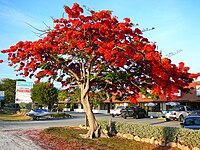flamboyant
English
[edit]Alternative forms
[edit]Etymology
[edit]Borrowed from French flamboyant (“flaming, wavy”), participle of flamboyer (“to flame”), from Old French flamboier, from flambe (“flame”). The architectural style derives its name from the flame-like shapes in the tracery.
Pronunciation
[edit]- (Received Pronunciation) IPA(key): /flamˈbɔɪ.ənt/
- (General American) IPA(key): /flæmˈbɔɪ.(j)ənt/
- (General Australian) IPA(key): /flæmˈbɔɪ.(j)ənt/
Audio (General Australian): (file)
- Hyphenation: flam‧boy‧ant
- Rhymes: -ɔɪ.ənt
Adjective
[edit]flamboyant (comparative more flamboyant, superlative most flamboyant)
- Showy, bold or audacious in behaviour, appearance, style, etc.; ostentatious.
- 1902, G. K. Chesterton, “The Optimism of Byron”, in Twelve Types:
- When we see some of the monstrous and flamboyant blossoms that enrich the equatorial woods, we do not feel that they are conflagrations of nature; silent explosions of her frightful energy. We simply find it hard to believe that they are not wax flowers grown under a glass case.
- 1920, Frederic Taber Cooper, The Craftsmanship of Writing, Chapter VI: The Question of Clearness,
- But a scorn of flamboyant neckties and checkerboard trousers is no excuse for going to the opposite extreme of a blue flannel shirt and overalls; […] .
- 1962 May 12, Douglas MacArthur, Duty, honor, country:
- The unbelievers will say they are but words, but a slogan, but a flamboyant phrase.
- (architecture) Referring to the final stage of French Gothic architecture from the 14th to the 16th centuries.
- 1891, Sabine Baring-Gould, chapter XIX, in In Troubadour-Land: A Ramble in Provence and Languedoc, Avignon:
- S. Pierre is a flamboyant church, the details passing into Renaissance.
- 1911, “Bruges”, in Encyclopædia Britannica Eleventh Edition:
- The second is a chapel of two storeys, the lower dating from 1150, while the upper was rebuilt in the 15th century, and there is a rich Flamboyant entrance with a stairway (1533).
- 1913, “Abbey of Saint-Ouen”, in Catholic Encyclopedia:
- The nave and central tower, more flamboyant in design, were finished early in the sixteenth century after the original plan.
- Of a blade: forged in a wavy, undulating pattern, like a flame-bladed sword or a kris.
- Synonym: serpentine
- 1851 April 12, William John Bernhard-Smith, Notes and Queries, volume s1-III, number 76, London: Bell & Daldy, →ISSN, page 292:
- Ancient swords were frequently “flamboyant,” or with waved edges; more especially those used for purposes of state. The Dukes of Burgundy bore a two-handed sword of this form. Indeed, “flaming swords,” as they were called, were worn down to the times of our Charles II., and perhaps later.
Derived terms
[edit]Translations
[edit]
|
|
Noun
[edit]flamboyant (plural flamboyants)
- The royal poinciana (Delonix regia), a showy tropical tree from Madagascar.
- 1919, W[illiam] Somerset Maugham, chapter 45, in The Moon and Sixpence, [New York, N.Y.]: Grosset & Dunlap Publishers […], →OCLC:
- The schooners moored to the quay are trim and neat, the little town along the bay is white and urbane, and the flamboyants, scarlet against the blue sky, flaunt their colour like a cry of passion.
Translations
[edit]
|
Further reading
[edit] flamboyant on Wikipedia.Wikipedia
flamboyant on Wikipedia.Wikipedia  Delonix regia on Wikipedia.Wikipedia
Delonix regia on Wikipedia.Wikipedia
Danish
[edit]Etymology
[edit]Borrowed from French flamboyant (“flaming, wavy”), present participle of flamboyer (“to flame, blaze”).
Pronunciation
[edit]Adjective
[edit]flamboyant
Inflection
[edit]| positive | comparative | superlative | |
|---|---|---|---|
| indefinite common singular | flamboyant | — | —2 |
| indefinite neuter singular | flamboyant | — | —2 |
| plural | flamboyante | — | —2 |
| definite attributive1 | flamboyante | — | — |
1 When an adjective is applied predicatively to something definite,
the corresponding "indefinite" form is used.
2 The "indefinite" superlatives may not be used attributively.
Synonyms
[edit]French
[edit]Pronunciation
[edit]Participle
[edit]flamboyant
Adjective
[edit]flamboyant (feminine flamboyante, masculine plural flamboyants, feminine plural flamboyantes)
- flaming (also heraldry)
- flamboyant
Descendants
[edit]- → Danish: flamboyant
- → English: flamboyant
- → German: flamboyant
- → Romanian: flamboiant
Noun
[edit]flamboyant m (plural flamboyants)
Derived terms
[edit]Descendants
[edit]- → English: flamboyant
- → Portuguese: flamboaiã, flamboyant (unadapted), flamboiã, flambuaiã
- → Spanish: flamboyán, framboyán
Further reading
[edit]- “flamboyant”, in Trésor de la langue française informatisé [Digitized Treasury of the French Language], 2012.
German
[edit]Etymology
[edit]Borrowed from French flamboyant.
Pronunciation
[edit]Adjective
[edit]flamboyant (strong nominative masculine singular flamboyanter, comparative flamboyanter, superlative am flamboyantesten)
Declension
[edit]Further reading
[edit]- “flamboyant” in Duden online
- “flamboyant” in Digitales Wörterbuch der deutschen Sprache
Portuguese
[edit]Etymology
[edit]Unadapted borrowing from French flamboyant.
Pronunciation
[edit]
Noun
[edit]flamboyant m (plural flamboyants)
- Alternative spelling of flamboaiã
Further reading
[edit]- “flamboyant”, in Dicionário Priberam da Língua Portuguesa (in Portuguese), Lisbon: Priberam, 2008–2025
- “flamboyant”, in Michaelis Dicionário Brasileiro da Língua Portuguesa (in Portuguese), São Paulo: Editora Melhoramentos, 2015–2025
- English terms borrowed from French
- English terms derived from French
- English terms derived from Old French
- English 3-syllable words
- English terms with IPA pronunciation
- English terms with audio pronunciation
- Rhymes:English/ɔɪ.ənt
- Rhymes:English/ɔɪ.ənt/3 syllables
- English lemmas
- English adjectives
- English terms with quotations
- en:Architecture
- English nouns
- English countable nouns
- en:Caesalpinia subfamily plants
- en:Personality
- Danish terms borrowed from French
- Danish terms derived from French
- Danish terms with IPA pronunciation
- Danish lemmas
- Danish adjectives
- French 3-syllable words
- French terms with IPA pronunciation
- French terms with audio pronunciation
- French non-lemma forms
- French present participles
- French lemmas
- French adjectives
- fr:Heraldry
- French nouns
- French countable nouns
- French masculine nouns
- fr:Personality
- German terms borrowed from French
- German terms derived from French
- German terms with IPA pronunciation
- German terms with audio pronunciation
- German lemmas
- German adjectives
- Portuguese terms borrowed from French
- Portuguese unadapted borrowings from French
- Portuguese terms derived from French
- Portuguese 3-syllable words
- Portuguese terms with IPA pronunciation
- Portuguese lemmas
- Portuguese nouns
- Portuguese countable nouns
- Portuguese terms spelled with Y
- Portuguese masculine nouns




